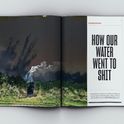In late 1973 the miners’ strike was causing severe disruption, challenging the authority of Edward Heath’s Conservative government. Parliament still had 18 months to run. William Waldegrave, Heath’s political secretary, recalled:
“So, into that last winter we went: the country rationed on energy and petrol use; industry working a three-day week; No 10 lit by Camping Gaz butane lamps. I argued that we should challenge the extra-parliamentary power of the unions at an early election, running under the slogan, “Who rules?”. Heath hung back from an early, confrontational election, seeing a far wider picture than I did. If he lost, he knew his historic Irish deal would collapse (and so it proved). His achievement of securing British entry to Europe would also be put at risk by Labour’s opportunistic opposition and their promise of a referendum.
“Worst of all would be the kind of victory (we did not doubt it would be victory) he would win. He hated the idea of winning on the divisive “Who rules?” question. He feared letting the right-wing genie out of the bottle, and a return to a coercive Conservatism, with the unions suppressed by the victory of a party representing a hard, militant middle-class. He did not want to see the end of the post-war attempt to make the Conservatives the party of one nation, outflanking class-based Labour. So he delayed.”
Robert Armstrong, Heath’s private secretary, recalled:
“I have a vivid memory of the last meeting with the TUC. Ministers were looking for a guarantee that, if the miners were given a pay increase beyond the counter-inflation policy, other unions would not seek to follow suit. It became clear they could not offer such a guarantee. There was a long silence, as the prime minister considered, and then he finally made up his mind and said the offer did not go far enough, and the meeting broke up.
“I have often wondered whether, if the meeting had adjourned for half an hour, so ministers could have met separately and discussed the position, some compromise might have been found to avert the need for an immediate election, and so create an opportunity to resolve the miners’ dispute, end the three-day week and... hold an election later in the year, when circumstances might be more propitious for the government. That is one of the great ‘what ifs’ of history.”
The election was held on 28th February 1974. No party had a majority. Harold Wilson became the prime minister of a minority Labour government. In October 1974, he called another election and won a majority of three. In 1976 Wilson resigned and James Callaghan became the new prime minister. By 1977 deals were required with other parties to pass legislation. Every vote became a struggle and it seemed likely Callaghan would call another election.
On 7th September 1978, Tony Benn, then Energy Secretary, wrote in his diary:
“Cabinet at 10.30, and I was sure the election was going to be announced. Jim said there had been much speculation and he had consulted his ministers, especially Michael Foot and Denis Healey, but the responsibility was his, although it affected all our fates, and it was an enormous responsibility. He had considered other factors such as the Scottish Devolution Referendum, and the fact that according to most polls Labour voters do not want an election—though our activists do—and he announced that he’d written to the Queen to say that he did not propose to seek the dissolution of parliament.
I was most surprised, and indeed angry that the cabinet had not discussed a decision of this magnitude. I later discovered that he had decided this course on 17th August, so when he asked for our opinions last week, it was already a fait accompli.”
Following the strikes of the subsequent “Winter of Discontent,” the Conservative leader Margaret Thatcher tabled a motion of no confidence on 28th March 1979. It passed by one vote, triggering a general election five months before the end of the government’s term. The Conservatives won with a majority of 43.
In late August 2007 Peter Watt, Labour’s General Secretary, outlined to Gordon Brown the prospects for a snap election. Parliament still had over two and a half years to run; Brown had been PM for two months:
“Going to the country early seemed smart. There would be financial advantages. ‘An election in October makes sense,’ I said. ‘It will cost us £8m and we will have an “immediate ask” to donors which will be quite appealing.’ I had one other important message for Gordon. ‘You must be clear about your decision. What you can’t do is march us up to the top of the hill, then march us down again.’”
On 23rd September 2007, Chris Mullin MP arrived at the Labour Party Conference at Bournemouth:
“The place is in the grip of election fever. I had assumed it was all got up by the media but it appears that clever young strategists are furiously talking it up on the strength of a couple of good polls and some crap about Gordon needing his own mandate. Pure insanity. We have a majority of more than 60 which is unlikely to be improved upon. Apparently they are talking about early November. Good grief. It’s hard enough persuading the citizens of Sunderland [his constituency] to vote on a sunny evening in May, let alone a dark, rainy evening in November. ”
Peter Watt recalled:
“On Wednesday 3rd October David Cameron called our bluff at the Tory Party Conference. ‘So Mr Brown, what’s it to be?’ he taunted. ‘Call that election. We will fight. Britain will win.’ The next day a panicky Gordon summoned Ed Miliband, Ed Balls and Douglas Alexander for a crisis meeting. On Friday morning, Douglas called me. ‘Peter, Gordon’s not going to do it,’ he said quietly.”
“So, into that last winter we went: the country rationed on energy and petrol use; industry working a three-day week; No 10 lit by Camping Gaz butane lamps. I argued that we should challenge the extra-parliamentary power of the unions at an early election, running under the slogan, “Who rules?”. Heath hung back from an early, confrontational election, seeing a far wider picture than I did. If he lost, he knew his historic Irish deal would collapse (and so it proved). His achievement of securing British entry to Europe would also be put at risk by Labour’s opportunistic opposition and their promise of a referendum.
“Worst of all would be the kind of victory (we did not doubt it would be victory) he would win. He hated the idea of winning on the divisive “Who rules?” question. He feared letting the right-wing genie out of the bottle, and a return to a coercive Conservatism, with the unions suppressed by the victory of a party representing a hard, militant middle-class. He did not want to see the end of the post-war attempt to make the Conservatives the party of one nation, outflanking class-based Labour. So he delayed.”
Robert Armstrong, Heath’s private secretary, recalled:
“I have a vivid memory of the last meeting with the TUC. Ministers were looking for a guarantee that, if the miners were given a pay increase beyond the counter-inflation policy, other unions would not seek to follow suit. It became clear they could not offer such a guarantee. There was a long silence, as the prime minister considered, and then he finally made up his mind and said the offer did not go far enough, and the meeting broke up.
“I have often wondered whether, if the meeting had adjourned for half an hour, so ministers could have met separately and discussed the position, some compromise might have been found to avert the need for an immediate election, and so create an opportunity to resolve the miners’ dispute, end the three-day week and... hold an election later in the year, when circumstances might be more propitious for the government. That is one of the great ‘what ifs’ of history.”
The election was held on 28th February 1974. No party had a majority. Harold Wilson became the prime minister of a minority Labour government. In October 1974, he called another election and won a majority of three. In 1976 Wilson resigned and James Callaghan became the new prime minister. By 1977 deals were required with other parties to pass legislation. Every vote became a struggle and it seemed likely Callaghan would call another election.
On 7th September 1978, Tony Benn, then Energy Secretary, wrote in his diary:
“Cabinet at 10.30, and I was sure the election was going to be announced. Jim said there had been much speculation and he had consulted his ministers, especially Michael Foot and Denis Healey, but the responsibility was his, although it affected all our fates, and it was an enormous responsibility. He had considered other factors such as the Scottish Devolution Referendum, and the fact that according to most polls Labour voters do not want an election—though our activists do—and he announced that he’d written to the Queen to say that he did not propose to seek the dissolution of parliament.
I was most surprised, and indeed angry that the cabinet had not discussed a decision of this magnitude. I later discovered that he had decided this course on 17th August, so when he asked for our opinions last week, it was already a fait accompli.”
Following the strikes of the subsequent “Winter of Discontent,” the Conservative leader Margaret Thatcher tabled a motion of no confidence on 28th March 1979. It passed by one vote, triggering a general election five months before the end of the government’s term. The Conservatives won with a majority of 43.
In late August 2007 Peter Watt, Labour’s General Secretary, outlined to Gordon Brown the prospects for a snap election. Parliament still had over two and a half years to run; Brown had been PM for two months:
“Going to the country early seemed smart. There would be financial advantages. ‘An election in October makes sense,’ I said. ‘It will cost us £8m and we will have an “immediate ask” to donors which will be quite appealing.’ I had one other important message for Gordon. ‘You must be clear about your decision. What you can’t do is march us up to the top of the hill, then march us down again.’”
On 23rd September 2007, Chris Mullin MP arrived at the Labour Party Conference at Bournemouth:
“The place is in the grip of election fever. I had assumed it was all got up by the media but it appears that clever young strategists are furiously talking it up on the strength of a couple of good polls and some crap about Gordon needing his own mandate. Pure insanity. We have a majority of more than 60 which is unlikely to be improved upon. Apparently they are talking about early November. Good grief. It’s hard enough persuading the citizens of Sunderland [his constituency] to vote on a sunny evening in May, let alone a dark, rainy evening in November. ”
Peter Watt recalled:
“On Wednesday 3rd October David Cameron called our bluff at the Tory Party Conference. ‘So Mr Brown, what’s it to be?’ he taunted. ‘Call that election. We will fight. Britain will win.’ The next day a panicky Gordon summoned Ed Miliband, Ed Balls and Douglas Alexander for a crisis meeting. On Friday morning, Douglas called me. ‘Peter, Gordon’s not going to do it,’ he said quietly.”













